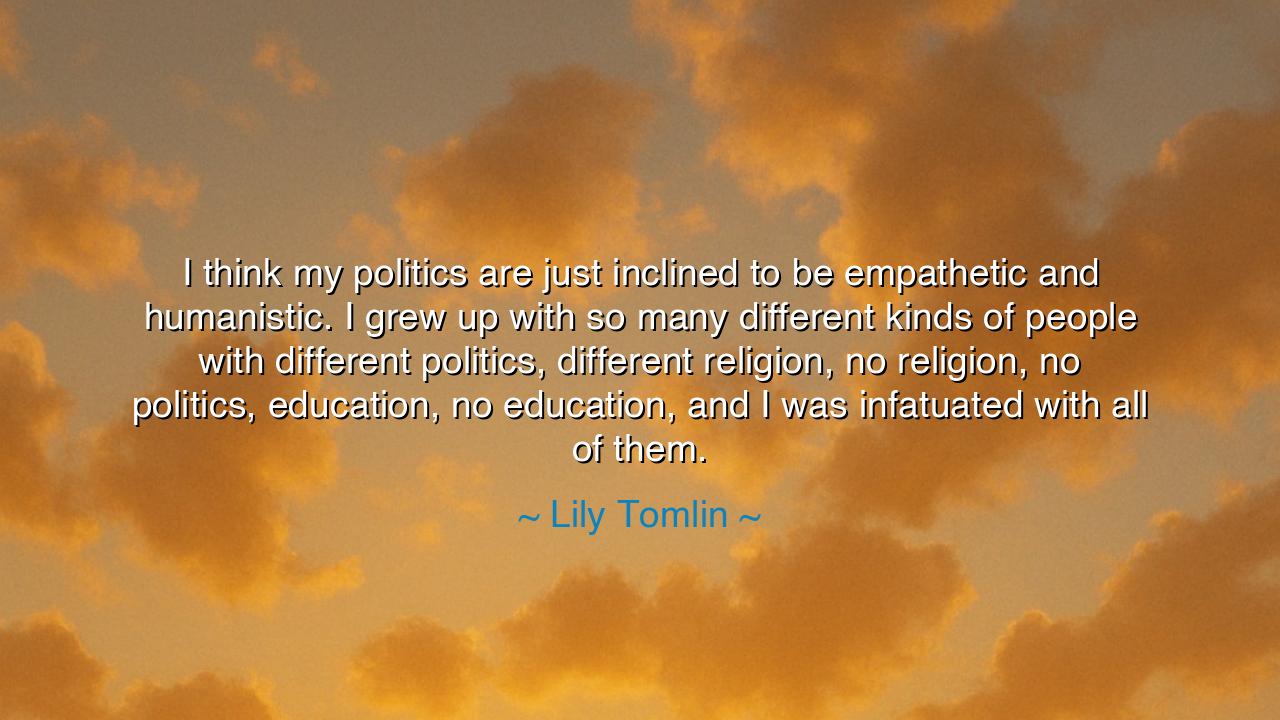
I think my politics are just inclined to be empathetic and
I think my politics are just inclined to be empathetic and humanistic. I grew up with so many different kinds of people with different politics, different religion, no religion, no politics, education, no education, and I was infatuated with all of them.






Lily Tomlin, with words simple yet profound, once said: “I think my politics are just inclined to be empathetic and humanistic. I grew up with so many different kinds of people with different politics, different religion, no religion, no politics, education, no education, and I was infatuated with all of them.” This utterance is not merely a reflection on personal belief—it is the testament of a soul who has looked upon humanity in all its variety and chosen to love it. Her voice, though modern, carries the cadence of ancient wisdom: that the truest way of life is not built on division, but on empathy, curiosity, and reverence for the many faces of humankind.
When she speaks of empathy, she touches on the deepest current in the river of human connection. Empathy is not agreement, nor is it indulgence—it is the act of seeing the world through another’s eyes, of stepping for a moment into the shoes of the stranger, the neighbor, the outcast. The ancients taught of such a virtue. Confucius, walking the roads of China, declared the Golden Rule: “Do not do unto others what you would not have them do unto you.” This was not a call to uniformity, but to compassion, for only in compassion does true community arise.
Her humanistic spirit, too, is the spirit that lifted civilizations from darkness into light. Humanism is the belief that every soul, regardless of creed or station, bears within it a spark of dignity. It is the recognition that the scholar and the laborer, the priest and the skeptic, the child of wealth and the child of poverty, all belong to one human family. To live with a humanistic heart is to look past the banners of tribe, sect, or party, and to see instead the shared breath, the shared hunger, the shared hope that unites us all.
Consider the story of Ashoka, the great emperor of India. In his early years he conquered with the sword, spreading terror across lands. But after witnessing the devastation of the Kalinga war—countless bodies lying lifeless, families torn asunder—he turned away from cruelty. Ashoka embraced compassion and empathy, choosing to rule not through fear, but through the principles of kindness, tolerance, and respect for all faiths. His reign became known not for conquest, but for a flowering of peace and respect among diverse peoples. In him, as in Tomlin’s words, we see how politics grounded in empathy and humanism become a source of healing rather than division.
Tomlin’s childhood among people of different religions, different politics, and different walks of life shaped her vision. She was not repelled by difference but “infatuated” with it. Here lies the heart of wisdom: to find wonder in diversity rather than threat, to approach difference not with fear, but with fascination. It is easy to retreat into circles of sameness, but greatness belongs to those who step beyond, who embrace the unknown, and who allow their souls to be stretched by what is foreign yet beautiful.
The lesson, then, is clear. We must cultivate in ourselves the art of empathy. When you meet someone whose beliefs clash with your own, do not harden your heart. Instead, ask: What wound shaped them? What dream sustains them? When you encounter another’s faith, do not scorn it, but listen for the echo of the divine that speaks through all tongues. When you see those with no learning, remember that wisdom is not confined to books, and that a life lived in hardship often contains truths deeper than any philosophy.
Practically, this means seeking out those unlike yourself. Sit with elders and hear their stories. Break bread with strangers. Read not only the words that confirm your view, but those that challenge it. In your community, be the one who bridges rather than the one who builds walls. For empathy is not an idea to admire—it is a practice, a discipline, a daily act of humility.
Future generations, take these words to heart: let your politics be not merely about power, but about humanity; let your creed be not about exclusion, but about understanding. In this way, you will live as Tomlin lived—not divided by difference, but infatuated with it, carrying forward the eternal work of weaving one people out of the countless threads of humankind.






AAdministratorAdministrator
Welcome, honored guests. Please leave a comment, we will respond soon